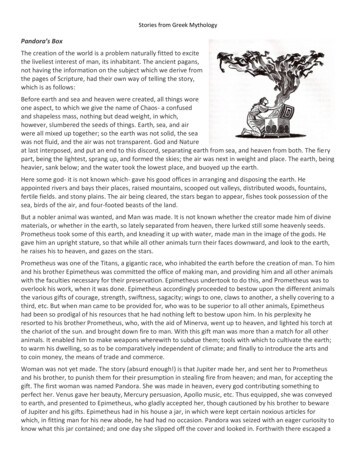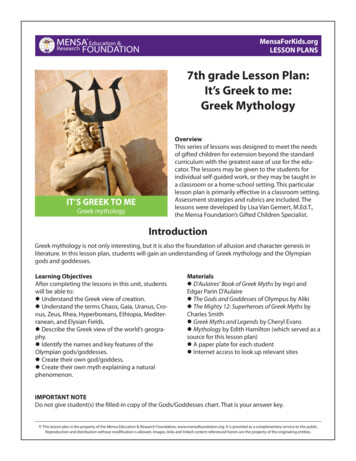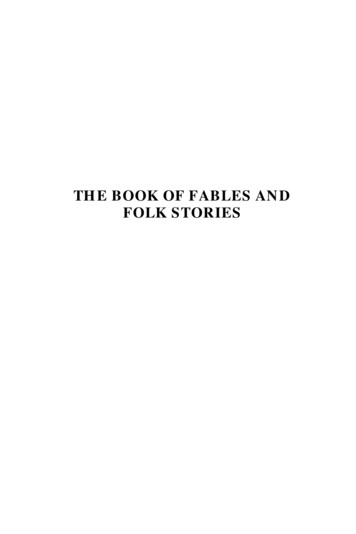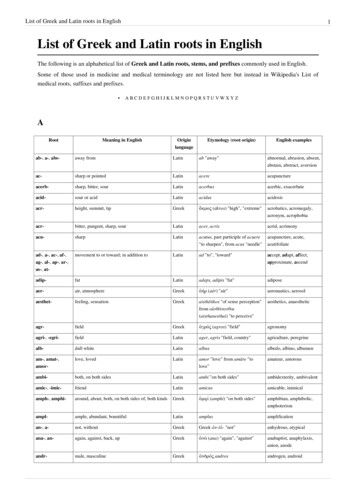
Transcription
Stories from Greek MythologyPandora’s BoxThe creation of the world is a problem naturally fitted to excitethe liveliest interest of man, its inhabitant. The ancient pagans,not having the information on the subject which we derive fromthe pages of Scripture, had their own way of telling the story,which is as follows:Before earth and sea and heaven were created, all things woreone aspect, to which we give the name of Chaos- a confusedand shapeless mass, nothing but dead weight, in which,however, slumbered the seeds of things. Earth, sea, and airwere all mixed up together; so the earth was not solid, the seawas not fluid, and the air was not transparent. God and Natureat last interposed, and put an end to this discord, separating earth from sea, and heaven from both. The fierypart, being the lightest, sprang up, and formed the skies; the air was next in weight and place. The earth, beingheavier, sank below; and the water took the lowest place, and buoyed up the earth.Here some god- it is not known which- gave his good offices in arranging and disposing the earth. Heappointed rivers and bays their places, raised mountains, scooped out valleys, distributed woods, fountains,fertile fields. and stony plains. The air being cleared, the stars began to appear, fishes took possession of thesea, birds of the air, and four-footed beasts of the land.But a nobler animal was wanted, and Man was made. It is not known whether the creator made him of divinematerials, or whether in the earth, so lately separated from heaven, there lurked still some heavenly seeds.Prometheus took some of this earth, and kneading it up with water, made man in the image of the gods. Hegave him an upright stature, so that while all other animals turn their faces downward, and look to the earth,he raises his to heaven, and gazes on the stars.Prometheus was one of the Titans, a gigantic race, who inhabited the earth before the creation of man. To himand his brother Epimetheus was committed the office of making man, and providing him and all other animalswith the faculties necessary for their preservation. Epimetheus undertook to do this, and Prometheus was tooverlook his work, when it was done. Epimetheus accordingly proceeded to bestow upon the different animalsthe various gifts of courage, strength, swiftness, sagacity; wings to one, claws to another, a shelly covering to athird, etc. But when man came to be provided for, who was to be superior to all other animals, Epimetheushad been so prodigal of his resources that he had nothing left to bestow upon him. In his perplexity heresorted to his brother Prometheus, who, with the aid of Minerva, went up to heaven, and lighted his torch atthe chariot of the sun. and brought down fire to man. With this gift man was more than a match for all otheranimals. It enabled him to make weapons wherewith to subdue them; tools with which to cultivate the earth;to warm his dwelling, so as to be comparatively independent of climate; and finally to introduce the arts andto coin money, the means of trade and commerce.Woman was not yet made. The story (absurd enough!) is that Jupiter made her, and sent her to Prometheusand his brother, to punish them for their presumption in stealing fire from heaven; and man, for accepting thegift. The first woman was named Pandora. She was made in heaven, every god contributing something toperfect her. Venus gave her beauty, Mercury persuasion, Apollo music, etc. Thus equipped, she was conveyedto earth, and presented to Epimetheus, who gladly accepted her, though cautioned by his brother to bewareof Jupiter and his gifts. Epimetheus had in his house a jar, in which were kept certain noxious articles forwhich, in fitting man for his new abode, he had had no occasion. Pandora was seized with an eager curiosity toknow what this jar contained; and one day she slipped off the cover and looked in. Forthwith there escaped a
Stories from Greek Mythologymultitude of plagues for hapless man,- such as gout, rheumatism, and colic for his body, and envy, spite, andrevenge for his mind,- and scattered themselves far and wide. Pandora hastened to replace the lid! but, alas!the whole contents of the jar had escaped, one thing only excepted, which lay at the bottom, and that washope. So we see at this day, whatever evils are abroad, hope never entirely leaves us; and while we have that,no amount of other ills can make us completely wretched.*May be referred to simply as Connelly supplied story.Return of Ulysses (Cyclops)The romantic poem of the Odyssey is now to engage our attention. It narrates the wanderings of Ulysses(Odysseus in the Greek language) in his return from Troy to his own kingdom Ithaca.From Troy the vessels first made land at Ismarus, city of the Ciconians, where, in a skirmish with theinhabitants, Ulysses lost six men from each ship. Sailing thence, they were overtaken by a storm which drovethem for nine days along the sea till they reached the country of the Lotus-eaters. Here, after watering,Ulysses sent three of his men to discover who the inhabitants were. These men on coming among the Lotuseaters were kindly entertained by them, and were given some of their own food, the lotus-plant, to eat. Theeffect of this food was such that those who partook of it lost all thoughts of home and wished to remain inthat country. It was by main force that Ulysses dragged these men away, and he was even obliged to tie themunder the benches of the ships.[Footnote: Tennyson in the "Lotus-eaters" has charminglyexpressed the dreamy, languid feeling which the lotus food is saidto have produced."How sweet it were, hearing the downward streamWith half-shut eyes ever to seemFalling asleep in a half dream!To dream and dream, like yonder amber lightWhich will not leave the myrrh-bush on the height;To hear each others' whispered speech;Eating the Lotos, day by day,To watch the crisping ripples on the beach,And tender curving lines of creamy spray:To lend our hearts and spirits whollyTo the influence of mild-minded melancholy;To muse and brood and live again in memory,With those old faces of our infancyHeaped over with a mound of grass,Two handfuls of white dust, shut in an urn of brass."]They next arrived at the country of the Cyclopes. The Cyclopes were giants, who inhabited an island of whichthey were the only possessors. The name means "round eye," and these giants were so called because theyhad but one eye, and that placed in the middle of the forehead. They dwelt in caves and fed on the wildproductions of the island and on what their flocks yielded, for they were shepherds. Ulysses left the main bodyof his ships at anchor, and with one vessel went to the Cyclopes' island to explore for supplies. He landed withhis companions, carrying with them a jar of wine for a present, and coming to a large cave they entered it, andfinding no one within examined its contents. They found it stored with the richest of the flock, quantities ofcheese, pails and bowls of milk, lambs and kids in their pens, all in nice order. Presently arrived the master of
Stories from Greek Mythologythe cave, Polyphemus, bearing an immense bundle of firewood, which he threw down before the cavern'smouth. He then drove into the cave the sheep and goats to be milked, and, entering, rolled to the cave'smouth an enormous rock, that twenty oxen could not draw. Next he sat down and milked his ewes, preparinga part for cheese, and setting the rest aside for his customary drink. Then, turning round his great eye, hediscerned the strangers, and growled out to them, demanding who they were, and where from. Ulyssesreplied most humbly, stating that they were Greeks, from the great expedition that had lately won so muchglory in the conquest of Troy; that they were now on their way home, and finished by imploring his hospitalityin the name of the gods. Polyphemus deigned no answer, but reaching out his hand seized two of the Greeks,whom he hurled against the side of the cave, and dashed out their brains. He proceeded to devour them withgreat relish, and having made a hearty meal, stretched himself out on the floor to sleep. Ulysses was temptedto seize the opportunity and plunge his sword into him as he slept, but recollected that it would only exposethem all to certain destruction, as the rock with which the giant had closed up the door was far beyond theirpower to remove, and they would therefore be in hopeless imprisonment. Next morning the giant seized twomore of the Greeks, and despatched them in the same manner as their companions, feasting on their flesh tillno fragment was left. He then moved away the rock from the door, drove out his flocks, and went out,carefully replacing the barrier after him. When he was gone Ulysses planned how he might take vengeance forhis murdered friends, and effect his escape with his surviving companions. He made his men prepare amassive bar of wood cut by the Cyclops for a staff, which they found in the cave. They sharpened the end of it,and seasoned it in the fire, and hid it under the straw on the cavern floor. Then four of the boldest wereselected, with whom Ulysses joined himself as a fifth. The Cyclops came home at evening, rolled away thestone and drove in his flock as usual. After milking them and making his arrangements as before, he seizedtwo more of Ulysses' companions and dashed their brains out, and made his evening meal upon them as hehad on the others. After he had supped, Ulysses approaching him handed him a bowl of wine, saying,"Cyclops, this is wine; taste and drink after thy meal of men's flesh." He took and drank it, and was hugelydelighted with it, and called for more. Ulysses supplied him once again, which pleased the giant so much thathe promised him as a favor that he should be the last of the party devoured. He asked his name, to whichUlysses replied, "My name is Noman."After his supper the giant lay down to repose, and was soon sound asleep. Then Ulysses with his four selectfriends thrust the end of the stake into the fire till it was all one burning coal, then poising it exactly above thegiant's only eye, they buried it deeply into the socket, twirling it round as a carpenter does his auger. Thehowling monster with his outcry filled the cavern, and Ulysses with his aids nimbly got out of his way andconcealed themselves in the cave. He, bellowing, called aloud on all the Cyclopes dwelling in the caves aroundhim, far and near. They on his cry flocked round the den, and inquired what grievous hurt had caused him tosound such an alarm and break their slumbers. He replied, "O friends, I die, and Noman gives the blow." Theyanswered, "If no man hurts thee it is the stroke of Jove, and thou must bear it." So saying, they left himgroaning.Next morning the Cyclops rolled away the stone to let his flock out to pasture, but planted himself in the doorof the cave to feel of all as they went out, that Ulysses and his men should not escape with them. But Ulysseshad made his men harness the rams of the flock three abreast, with osiers which they found on the floor ofthe cave. To the middle ram of the three one of the Greeks suspended himself, so protected by the exteriorrams on either side. As they passed, the giant felt of the animals' backs and sides, but never thought of theirbellies; so the men all passed safe, Ulysses himself being on the last one that passed. When they had got a fewpaces from the cavern, Ulysses and his friends released themselves from their rams, and drove a good part ofthe flock down to the shore to their boat. They put them aboard with all haste, then pushed off from theshore, and when at a safe distance Ulysses shouted out, "Cyclops, the gods have well requited thee for thyatrocious deeds. Know it is Ulysses to whom thou owest thy shameful loss of sight." The Cyclops, hearing this,
Stories from Greek Mythologyseized a rock that projected from the side of the mountain, and rending it from its bed, he lifted it high in theair, then exerting all his force, hurled it in the direction of the voice. Down came the mass, just clearing thevessel's stern. The ocean, at the plunge of the huge rock, heaved the ship towards the land, so that it barelyescaped being swamped by the waves. When they had with the utmost difficulty pulled off shore, Ulysses wasabout to hail the giant again, but his friends besought him not to do so. He could not forbear, however, lettingthe giant know that they had escaped his missile, but waited till they had reached a safer distance than before.The giant answered them with curses, but Ulysses and his friends plied their oars vigorously, and soonregained their companions.Ulysses next arrived at the island of Aeolus. To this monarch Jupiter had intrusted the government of thewinds, to send them forth or retain them at his will. He treated Ulysses hospitably, and at his departure gavehim, tied up in a leathern bag, with a silver string, such winds as might be hurtful and dangerous, commandingfair winds to blow the barks towards their country. Nine days they sped before the wind, and all that timeUlysses had stood at the helm, without sleep. At last quite exhausted he lay down to sleep. While he slept, thecrew conferred together about the mysterious bag, and concluded it must contain treasures given by thehospitable king Aeolus to their commander. Tempted to secure some portion for themselves, they loosed thestring, when immediately the winds rushed forth. The ships were driven far from their course, and back againto the island they had just left. Aeolus was so indignant at their folly that he refused to assist them further,and they were obliged to labor over their course once more by means of their oars.*May be referred to simply as Connelly supplied story.Echo and NarcissusEcho was a beautiful nymph, fond of the woods and hills, where shedevoted herself to woodland sports. She was a favourite of Diana, andattended her in the chase. But Echo had one failing; she was fond oftalking, and whether in chat or argument, would have the last word.One day Juno was seeking her husband, who, she had reason to fear,was amusing himself among the nymphs. Echo by her talk contrivedto detain the goddess till the nymphs made their escape. When Junodiscovered it, she passed sentence upon Echo in these words: "Youshall forfeit the use of that tongue with which you have cheated me,except for that one purpose you are so fond of- reply. You shall stillhave the last word, but no power to speak first."This nymph saw Narcissus, a beautiful youth, as he pursued the chaseupon the mountains. She loved him and followed his footsteps. O howshe longed to address him in the softest accents, and win him toconverse! but it was not in her power. She waited with impatience for him to speak first, and had her answerready. One day the youth, being separated from his companions, shouted aloud, "Who's here?" Echo replied,"Here." Narcissus looked around, but seeing no one, called out, "Come." Echo answered, "Come." As no onecame, Narcissus called again, "Why do you shun me?" Echo asked the same question. "Let us join oneanother," said the youth. The maid answered with all her heart in the same words, and hastened to the spot,ready to throw her arms about his neck. He started back, exclaiming, "Hands off! I would rather die than youshould have me!" "Have me," said she; but it was all in vain. He left her, and she went to hide her blushes inthe recesses of the woods. From that time forth she lived in caves and among mountain cliffs. Her form faded
Stories from Greek Mythologywith grief, till at last all her flesh shrank away. Her bones were changed into rocks and there was nothing leftof her but her voice. With that she is still ready to reply to any one who calls her, and keeps up her old habit ofhaving the last word.Narcissus's cruelty in this case was not the only instance. He shunned all the rest of the nymphs, as he haddone poor Echo. One day a maiden who had in vain endeavoured to attract him uttered a prayer that he mightsome time or other feel what it was to love and meet no return of affection. The avenging goddess heard andgranted the prayer.There was a clear fountain, with water like silver, to which the shepherds never drove their flocks, nor themountain goats resorted, nor any of the beasts of the forests; neither was it defaced with fallen leaves orbranches; but the grass grew fresh around it, and the rocks sheltered it from the sun. Hither came one day theyouth, fatigued with hunting, heated and thirsty. He stooped down to drink, and saw his own image in thewater; he thought it was some beautiful water-spirit living in the fountain. He stood gazing with admiration atthose bright eyes, those locks curled like the locks of Bacchus or Apollo, the rounded cheeks, the ivory neck,the parted lips, and the glow of health and exercise over all. He fell in love with himself. He brought his lipsnear to take a kiss; he plunged his arms in to embrace the beloved object. It fled at the touch, but returnedagain after a moment and renewed the fascination. He could not tear himself away; he lost all thought of foodor rest. while he hovered over the brink of the fountain gazing upon his own image. He talked with thesupposed spirit: "Why, beautiful being, do you shun me? Surely my face is not one to repel you. The nymphslove me, and you yourself look not indifferent upon me. When I stretch forth my arms you do the same; andyou smile upon me and answer my beckonings with the like." His tears fell into the water and disturbed theimage. As he saw it depart, he exclaimed, "Stay, I entreat you! Let me at least gaze upon you, if I may nottouch you." With this, and much more of the same kind, he cherished the flame that consumed him, so that bydegrees be lost his colour, his vigour, and the beauty which formerly had so charmed the nymph Echo. Shekept near him, however, and when he exclaimed, "Alas! alas! she answered him with the same words. Hepined away and died; and when his shade passed the Stygian river, it leaned over the boat to catch a look ofitself in the waters. The nymphs mourned for him, especially the water-nymphs; and when they smote theirbreasts Echo smote hers also. They prepared a funeral pile and would have burned the body, but it wasnowhere to be found; but in its place a flower, purple within, and surrounded with white leaves, which bearsthe name and preserves the memory of Narcissus.*May be referred to simply as Connelly supplied story.HerculesHercules was the son of Jupiter and Alcmena. As Juno was always hostile to the offspring of her husband bymortal mothers, she declared war against Hercules from his birth. She sent two serpents to destroy him as helay in his cradle, but the precocious infant strangled them with his own hands. He was, however, by the arts ofJuno rendered subject to Eurystheus and compelled to perform all his commands. Eurystheus enjoined uponhim a succession of desperate adventures, which are called the "Twelve Labors of Hercules." The first was thefight with the Nemean lion. The valley of Nemea was infested by a terrible lion. Eurystheus ordered Herculesto bring him the skin of this monster. After using in vain his club and arrows against the lion, Herculesstrangled the animal with his hands. He returned carrying the dead lion on his shoulders; but Eurystheus wasso frightened at the sight of it and at this proof of the prodigious strength of the hero, that he ordered him todeliver the account of his exploits in future outside the town.His next labor was the slaughter of the Hydra. This monster ravaged the country of Argos, and dwelt in aswamp near the well of Amymone. This well had been discovered by Amymone when the country was
Stories from Greek Mythologysuffering from drought, and the story was that Neptune, who loved her, had permitted her to touch the rockwith his trident, and a spring of three outlets burst forth. Here the Hydra took up his position, and Herculeswas sent to destroy him. The Hydra had nine heads, of which the middle one was immortal. Hercules struck offits heads with his club, but in the place of the head knocked off, two new ones grew forth each time. At lengthwith the assistance of his faithful servant Iolaus, he burned away the heads of the Hydra, and buried the ninthor immortal one under a huge rock.Another labor was the cleaning of the Augean stables. Augeas, king of Elis, had a herd of three thousand oxen,whose stalls had not been cleansed for thirty years. Hercules brought the rivers Alpheus and Peneus throughthem, and cleansed them thoroughly in one day.His next labor was of a more delicate kind. Admeta, the daughter ofEurystheus, longed to obtain the girdle of the queen of the Amazons,and Eurystheus ordered Hercules to go and get it. The Amazons were anation of women. They were very warlike and held several flourishingcities. It was their custom to bring up only the female children; theboys were either sent away to the neighboring nations or put to death.Hercules was accompanied by a number of volunteers, and aftervarious adventures at last reached the country of the Amazons.Hippolyta, the queen, received him kindly, and consented to yield himher girdle, but Juno, taking the form of an Amazon, went andpersuaded the rest that the strangers were carrying off their queen.They instantly armed and came in great numbers down to the ship.Hercules, thinking that Hippolyta had acted treacherously, slew her,and taking her girdle made sail homewards.Another task enjoined him was to bring to Eurystheus the oxen ofGeryon, a monster with three bodies, who dwelt in the island Erytheia(the red), so called because it lay at the west, under the rays of thesetting sun. This description is thought to apply to Spain, of whichGeryon was king. After traversing various countries, Hercules reachedat length the frontiers of Libya and Europe, where he raised the two mountains of Calpe and Abyla, asmonuments of his progress, or, according to another account, rent one mountain into two and left half oneach side, forming the straits of Gibraltar, the two mountains being called the Pillars of Hercules. The oxenwere guarded by the giant Eurytion and his two-headed dog, but Hercules killed the giant and his dog andbrought away the oxen in safety to Eurystheus.The most difficult labor of all was getting the golden apples of the Hesperides, for Hercules did not knowwhere to find them. These were the apples which Juno had received at her wedding from the goddess of theEarth, and which she had intrusted to the keeping of the daughters of Hesperus, assisted by a watchfuldragon. After various adventures Hercules arrived at Mount Atlas in Africa. Atlas was one of the Titans whohad warred against the gods, and after they were subdued, Atlas was condemned to bear on his shoulders theweight of the heavens. He was the father of the Hesperides, and Hercules thought might, if anyone could, findthe apples and bring them to him. But how to send Atlas away from his post, or bear up the heavens while hewas gone? Hercules took the burden on his own shoulders, and sent Atlas to seek the apples. He returnedwith them, and though somewhat reluctantly, took his burden upon his shoulders again, and let Herculesreturn with the apples to Eurystheus*May be referred to simply as Connelly supplied story.
Stories from Greek MythologyPerseus and Medusa.Perseus was the son of Jupiter and Danae. His grandfather Acrisius, alarmed by an oracle which had told himthat his daughter's child would be the instrument of his death, caused the mother and child to be shut up in achest and set adrift on the sea. The chest floated towards Seriphus,where it was found by a fisherman who conveyed the mother andinfant to Polydectes, the king of the country, by whom they weretreated with kindness. When Perseus was grown up Polydectes senthim to attempt the conquest of Medusa, a terrible monster who hadlaid waste the country. She was once a beautiful maiden whose hairwas her chief glory but as she dared to vie in beauty with Minerva, thegoddess deprived her of her charms and changed her beautifulringlets into hissing serpents. She became a cruel monster of sofrightful an aspect that no living thing could behold her without beingturned into stone. All around the cavern where she dwelt might beseen the stony figures of men and animals which had chanced tocatch a glimpse of her and had been petrified with the sight. Perseus,favored by Minerva and Mercury, the former of whom lent him hershield and the latter his winged shoes, approached Medusa while sheslept and taking care not to look directly at her, but guided by herimage reflected in the bright shield which he bore, he cut off her headand gave it to Minerva, who fixed it in the middle of her Aegis.*May be referred to simply as Connelly supplied story.The MinotaurA long time ago – almost before history began – King Minos ruled the lovely island of Crete. The father ofMinos was none other than Zeus, lord of all the gods, and he made sure that his son’s wealth and power onlygrew and grew.Minos built a navy, and his ships sailed far and wide, bringing back goods, taxes, and something even moreimportant than those – knowledge. For instance, when Minos wanted to build a palace that would strike aweand wonder into all who laid eyes on it, he asked his sea captain, ”Of all the palaces you have seen, on all yourtravels over the seas, which was the most magnificent?”And the sea captain replied, ”Your Majesty, the palace of Aegeus , King of Athens, surpasses all others for itsbeauty and grace. It was designed by Deadalus and the Athenians boast that he is the most brilliant architectwho has ever lived.”When he heard this, King Minos ordered the sea captain to fetch Deadalus to Crete. The sea captain sailed toAthens and told King Aegeus that Minos had need of his chief architect and as Minos was the most powerfulleader of those times, King Aegeus could not deny him his wish.And so Daedalus brought his knowledge and great skill to Crete and there he designed a wonderful palace forMinos. It was built on three floors, which was very high for buildings of those days, and the bathrooms andkitchens had plumbing that was far ahead of their times. Everywhere you went inside, you saw the doubleheaded axe of King Minos which was his symbol of power. Upstairs, the walls were covered with brightpictures of dances and festivities. On them, you could see the young men and women of Crete leaping overthe horns of bulls. It a dangerous sport indeed, but the Cretans loved to show off their skill and bravery.
Stories from Greek MythologyThe happiness of Minos was almost complete – there was but one sadness in his life. His wife gave birth to achild that was strange and unnatural. Although its face was human, it walked on four feet with hooves. Hornscame out of his head, and in time it grew into a terrible monster – half man, half bull. When it bellowed thewhole land of Crete shook, the walls of the palace trembled, and there were storms at sea. The peoplegossiped about this strange child of the King, whom they called the Minotaur. Minos wanted to have it killed,but he thought the gods would be angry with him if he killed his own son. Instead he ordered Daedalus tobuild a maze, known as a labyrinth, where the Minotaur could live out of sight and out of mind.Daedalus built a Labyrinth underground that was so intricate and cunning in its design, that even he himselfhad trouble finding the way out.The Minotaur agreed to live in the labyrinth, but he demanded thathuman beings be sent into his maze at regular intervals, otherwisehe would rage with hunger even until the walls of the palace felldown. And so Minos ordered the kings of the nearby lands to sendships full of their young people to sacrifice to the Minotaur. Everyninth year it was the turn of Athens to send its human tribute toCrete. Twice, King Aegeus agreed to this – for he was still afraid ofMinos and the power of his navy – but on the third occasion, hisson, Prince Theseus said to him, ”Father, this time, let me sail toCrete, and I shall kill the Minotaur and end this misery for ourpeople. ”Aegeus was very reluctant to send his beloved son to chance his lifeagainst the Minotaur but as he could see no other way out of theterrible situation for his people, he agreed.It was decided that the ship of Theseus would carry two sets of sails.If the mission was successful, it would return to Athens under whitesails, but if Theseus was killed by the Minotaur, it would sail backunder black sails. That way, the people of Athens would receive thenews of the outcome all the sooner.Prince Theseus sailed to Crete and stayed with King Minos in his magnificent palace. There, on occasion, hecaught sight of Princess Ariadne, the lovely daughter of King Minos. When Ariadne saw Theseus she felt greatpity for him.“Certainly, he looks very nice,” she thought, “But what a shame that his life is about to end so soon and soterribly! For even if he succeeds in killing the Minotaur, he will never find his way out of the dark and windinglabyrinth.”And when Theseus saw Ariadne he thought, ”Surely the King’s own daughter knows some of his secrets. If onlyshe could be persuaded to help me, I might stand a better chance of killing the Minotaur and escaping fromthe labyrinth with my life.”One day, when for a very short time Theseus found himself alone with Ariadne, he went down on his kneesand begged her for any help that she could give him.Ariadne promised to do what she could and that evening she asked the advice of Daedalus for if anyone knewthe way out of the maze, it would surely be its architect. Daedalus too wanted to help Theseus for they wereboth from the City of Athens, and so he gave Ariadne his secret plan of the labyrinth – but she was dismayedwhen she examined it and saw the numerous twists and turns in the underground passageways. Even with amap it
Stories from Greek Mythology Pandora’s Box The creation of the world is a problem naturally fitted to excite the liveliest interest of man, its inhabitant. The ancient pagans, not having the information on the subject which we derive from the pages of Scripture, had










